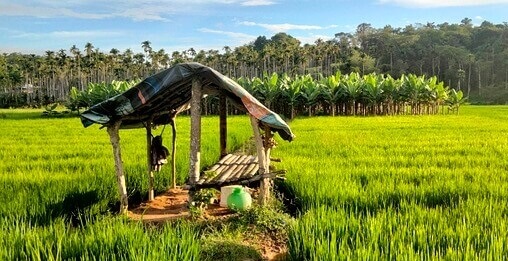Kerala, also known as God’s own country, is a state situated on the southwestern coast of India. Agriculture is a major source of livelihood in Kerala, with the majority of the population living in rural areas and depending on agriculture for their livelihood.
Kerala’s tropical climate, abundant rainfall, and fertile soil make it suitable for a variety of crops. In this article, we will discuss the best crops for Kerala agriculture, why they are the best, how they are grown, the importance of organic farming, income from agriculture, and the total export of agriculture crops.
- Coconut: Kerala is known for its coconut groves. Coconut trees provide a variety of products, including coconut oil, copra, coir, and tender coconut water. Coconut oil is widely used in cooking and is also used in the manufacture of soaps, cosmetics, and other products.
- Rubber: Rubber is another important crop in Kerala. The state accounts for about 90% of India’s natural rubber production. Rubber is grown on plantations and is used in the manufacture of tires, footwear, and other products.
- Tea: Tea is grown in the hilly areas of Kerala, primarily in the Idukki district. Tea is an important export crop and is also consumed locally.
- Coffee: Coffee is grown in the hilly areas of Kerala, primarily in the Wayanad district. Coffee is an important export crop and is also consumed locally.
- Pepper: Pepper is one of the most valuable crops in Kerala. It is grown in the hilly areas of the state and is widely used as a spice in cooking.
- Cardamom: Cardamom is grown in the hilly areas of Kerala, primarily in the Idukki district. It is widely used as a spice in cooking and is also used in the manufacture of perfumes and other products.
- Banana: Banana is a popular fruit in Kerala and is grown throughout the state. The state is known for its varieties of bananas, including Nendran, Poovan, and Robusta.
- Pineapple: Pineapple is grown in the hilly areas of Kerala, primarily in the Wayanad district. It is an important export crop and is also consumed locally.
- Why are these the best crops?
These crops are considered the best for Kerala agriculture because they are well-suited to the state’s tropical climate and fertile soil. They are also in high demand both locally and globally, which makes them profitable for farmers.
How are these crops grown?
These crops are grown on plantations and small farms. Most farmers use traditional farming methods, although some are beginning to adopt modern techniques to improve crop yields and quality. Rubber, for example, is tapped from trees using traditional methods, but modern technology is being used to improve the efficiency of the process.
Importance of Organic Farming
Organic farming is becoming increasingly popular in Kerala. It involves using natural methods to grow crops without the use of synthetic pesticides and fertilizers. Organic farming is important because it helps to preserve the soil, water, and biodiversity, and it also produces healthier food. Organic farming is particularly important in Kerala because the state is known for its high levels of pesticide use, which has led to health problems for farmers and their families.
Income from Agriculture
Agriculture is an important source of income for many people in Kerala. The income from agriculture varies depending on the crop, the size of the farm, and the market demand for the product. Rubber, for example, is one of the most profitable crops in Kerala, with farmers earning around Rs. 150 per kg of rubber. Coconut is also a profitable crop, with farmers earning around Rs. 10-15 per coconut.
Total Export of Agriculture Crops
Kerala exports a variety of agricultural products, including spices, tea, coffee, rubber, coconuts, and pineapple. According to the Agricultural and Processed Food Products Export Development Authority (APEDA), Kerala’s total export of agricultural products was valued at USD 2.05 billion in 2020-21. The major markets for Kerala’s agricultural products include the United States, the United Arab Emirates, Saudi Arabia, and European Union countries.
Organic farming has also opened up new opportunities for farmers to earn income from their crops. The demand for organic products is growing both locally and globally, and farmers who switch to organic farming can earn higher prices for their products. The government of Kerala has also launched several initiatives to support organic farming, including subsidies for organic inputs and training programs for farmers.
In addition to traditional crops, Kerala is also exploring new crops and farming practices. For example, the state is promoting the cultivation of exotic fruits like dragon fruit and passion fruit. The government is also promoting aquaculture, which involves farming fish and other aquatic animals in controlled environments. Aquaculture has the potential to provide a sustainable source of income for farmers and also helps to conserve wild fish populations.
Conclusion:
Kerala’s agriculture sector has a lot of potential, and the state is well-suited for a variety of crops. Coconut, rubber, tea, coffee, pepper, cardamom, banana, and pineapple are some of the best crops for Kerala agriculture due to their suitability to the state’s climate and soil, as well as their profitability. Organic farming is becoming increasingly popular in Kerala, and the state is also exploring new crops and farming practices to diversify its agricultural sector.
The income from agriculture varies depending on the crop and the market demand, but there is a lot of potential for farmers to earn income from their crops. The total export of agricultural products from Kerala is significant, and the government is promoting initiatives to support organic farming and explore new opportunities in the sector.
